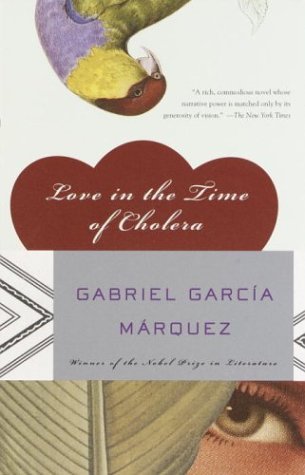I'm glad that I read it.
But reading it felt a bit like I imagine it feels for people who don't like to read, to read.
The sumptuous prose, the sensual Colombian culture, the hyperbolic, almost mythic characters -- you've heard about it before. And even after much reflection, I still can't put my finger on why I don't love this book. It is, undeniably, a masterpiece.
I certainly appreciate it.
I understand why people love it. But I don't. I'd love to hear from people who do love it about what it means to them.
I will say, though, that this book moved me. In really rather painful ways. So I guess that might be part of it.
I think this is a novel about the ravages of passionate longing and the redemptive possibilities that remain in that longing even as it ravages. Its spurned lover, Florentino Ariza, who spends his life in affairs with woman after woman whom he cannot love from beneath the shadow of his adored Fermina Daza, becomes the mythic, and yet somehow simultaneously pathetic, champion of the kind of love that is so consuming, so controlling, so paralyzing, that it can be mistaken for cholera.
Their story is about the costs of idealizing the sharp passion of young love and the pain of remembering the past and the times when you were happiest:
Despite the perpetual rain, the sordid merchants, and the Homeric vulgarity of its carriage drivers, she would always remember Paris as the most beautiful city in the world, not because of what it was or was not in reality, but because it was linked to the memory of her happiest years.
As Florentino watches from afar, Fermina lives married life through cycles of alternating rage and seeming wedded bliss. Nothing really makes sense in this story. And yet there is a certain kind of revelatory wisdom about human nature in the intense nonsense of its characters' foibles and indiscretions.
In the end, (spoiler alert!), Florentino Ariza is faithful to Fermina Daza, faithful through his myriad acts of unfaithfulness and her marriage and "fifty-three years, seven months, eleven days and nights," and Garcia Marquez does grant them their own kind of happily ever after, fetid and sweltering though it may be, as after a lifetime of longing, they finally drift eternally together down a river to La Dorada, unable, and yet also undesiring, to disembark because of the cholera flag the ship's captain has chosen to fly.
This book is by no means prescriptive for how we ought to love. But it is absolutely descriptive of the ways that we do love. The ways that what Garcia Marquez calls "intrepid love" has a life and will of its own, and the ways it can change us irrevocably and completely without our control.
Love in the Time of Cholera is worth it. But its not easy. And maybe that is precisely the point.


No comments:
Post a Comment